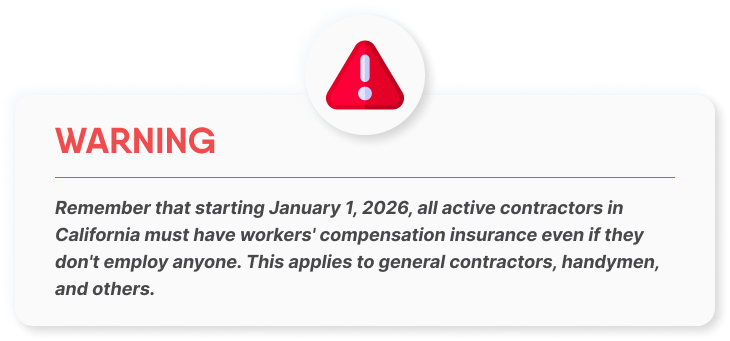If you work as a contractor in Los Angeles, you need more than just your tools to do the job.
Roofing, plumbing electrical work, HVAC systems, or general contracting all require you to excel—in your work and in legal matters. This means you must have the correct licenses and insurance to work in California.
Not clear on what this means for you? Let’s examine what you need to follow the rules and safeguard your business.
Who Handles Contractor Licensing in Los Angeles?
The California Contractors State License Board (CSLB) grants licenses to contractors in different trades. Here’s what you should know:
Alternate Phone Number: 512-463-6599 (For calls outside Texas)
Alternate Phone Number: 512-463-6599 (For calls outside Texas)
Phone: 1-800-321-2752
Alternate Phone Number: 512-463-6599 (For calls outside Texas)
Alternate Phone Number: 512-463-6599 (For calls outside Texas)
Address: Contractors State License Board
12501 East Imperial Hwy. Suite 600. Norwalk CA 90650
For more information, visit: https://www.cslb.ca.gov
Los Angeles, like the rest of California, requires contractors to have a license. It’s not optional; it’s the law. If you work without the right license, you risk big fines and possible criminal charges.
Moreover, owning a license proves to your customers that you’re a dedicated expert they can count on to complete the work. It’s not just about meeting legal rules. A license plays a key role in growing a successful brand and gaining your clients’ confidence.
Contractor Licensing Rules in Los Angeles
Even in one state, professional licensing is a tricky subject. Here’s what every contractor working in California needs to understand:

Who Needs a License?
Contractors doing work worth $500 or more (this includes labor and materials) must have a valid license from the state.

Renewal
In California, you have to renew your contractor license every two years. Keep track of this to avoid any problems with your business.

License Classifications
California uses different license types based on your trade. These include Class C (for specialty contractors like plumbers or electricians) and Class B (for general contractors).

Requirements
To qualify, you need to pass trade and law tests, have at least four years of experience at the journeyman level, and meet money-related standards, including getting a bond.
Insurance Requirements for Contractors
Licenses are just one piece of the puzzle. Without proper insurance, you’re putting your business—and your clients—at risk. Let’s check out the key coverages for contractors in Los Angeles.

General Liability Insurance
Regardless of your trade, general liability insurance is crucial. It guards your business against third-party claims involving bodily harm, property damage, and more. For instance, if a client stumbles over your gear and gets injured, or if you damage their property, your general liability policy covers the expenses.

Workers’ Compensation Insurance
If you employ workers, California law says you need workers’ compensation insurance. This covers medical costs and lost pay if a worker gets hurt on the job. In a physical job like contracting, this insurance is essential to keep your team safe—and it’s necessary to follow the rules.


Commercial Auto Insurance
Contractors depend on their vehicles, be it a pickup truck full of tools or a van with HVAC gear. Commercial auto insurance protects your work vehicle from accidents, theft, and damage. If you use a personal vehicle for work, check if your policy covers business use. Without it, you might end up in trouble if you crash.

Professional Liability Insurance
This policy also called errors and omissions (E&O) insurance, guards against claims of negligence, mistakes, or failure to deliver promised services. It’s helpful for contractors involved in design, consultation, or technical work that needs high-level expertise.
Now that we’ve covered insurance, we’ll dig deeper into the licensing requirements.
Specific Contractor Licensing Requirements by Trade
| Contractor Type | License Needed | Insurance Requirements | Additional Notes |
|---|---|---|---|
| Plumbing Contractors | Class C-36 | General liability, workers’ comp, commercial auto for work vans. | Consider pollution liability for environmental protection. |
| Electrical Contractors | Class C-10 | General liability, workers’ comp, commercial auto for moving equipment. | Bonding may be required for larger projects. |
| HVAC Contractors | Class C-20 | General liability, workers’ comp, commercial auto. | Consider additional coverage for refrigeration systems. |
| General Contractors | Class B | General liability, workers’ comp for employees, commercial auto if vehicles are used. | Builder’s risk insurance may be needed for larger projects. |
Key Takeaways
Working as a contractor in Los Angeles means you have to handle many tasks, but licensing and insurance should be your top priorities. Here’s what you should remember:
- Get the Right Insurance: Shield yourself, your company, and your customers with general liability, workers’ comp, and other policies.
- Follow the Rules: Stay on top of renewals and shifts in state laws to steer clear of penalties and other problems.
- Get Licensed: It’s required by law and it gives a boost to your credibility with clients.
Frequently Asked Questions (FAQ)
Are you wondering about contractor licensing or insurance in Los Angeles? Here are some questions we hear a lot.
No, you don’t need a contractor’s license in California for jobs costing less than $500, including labor and materials. But it’s a good idea to have insurance to protect yourself and your customers even for small jobs.
Working without a valid contractor’s license can result in serious problems. You might face big fines, have to stop working, and in some cases even face criminal charges. It can also hurt your reputation making it harder to find customers in the future.
No, you don’t need to have workers’ compensation insurance if you run your own business without any employees. Keep in mind that this rule changes in 2026. From that year on, all contractors must get workers’ comp insurance, no matter how many people they employ.
General liability protects you from claims about injuries, damage to property, and accidents that happen while you’re working. Professional liability (also known as E&O) covers you if someone claims you made mistakes, were careless, or didn’t deliver what you said you would. Depending on the type of contracting work you do, both kinds of insurance might be crucial.

